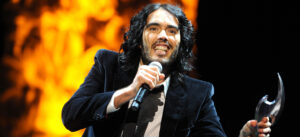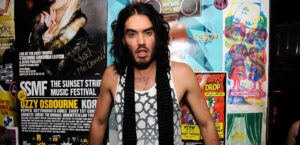I have been obsessed with Russell Brand since I was 11. I thought he stole the show in St Trinian’s and again in Forgetting Sarah Marshall. I decided not to vote long before I legally could after he told Paxman he couldn’t be bothered. And I listened religiously to his podcasts and watched his YouTube channel since the late 2010s. That said, it hasn’t been an entirely straightforward obsession. Things turned a bit sour during his Messiah Phase. I felt foolish when he called for a real revolution, confused when he married Katy Perry on an elephant, and then deeply embarrassed when he had Ed Miliband round to tea. There followed a brief cooling-off period during which I registered to vote.
The two years I spent forgetting Brand coincided with him slipping off the radar. But it wasn’t long before he was back in the public eye — and in my life. Before the divide between establishment and anti-establishment became as unbridgeable as it is today, Brand hosted a podcast called “Under The Skin” in which he interviewed smart and thoughtful guests including Jordan Peterson, Yuval Harari, Sam Harris, Lena Dunham and Ekhart Tolle. Although his style could grate a little, with his unnecessarily long words and irksome innuendoes, the show was often fascinating. Brand’s engaged curiosity led the guests in unexpected directions.
It was 2020 when my wavering fandom solidified into something more concrete. For those of us who looked around and saw no rhyme or reason to the policies bringing our lives to a standstill, who couldn’t understand why anti-lockdown protests of thousands of people in the streets of London were barely mentioned in mainstream news, Brand was a breath of fresh air. There was such a scarcity of public figures questioning the Covid narrative that lockdown sceptics like me were willing to overlook almost all and any character defects when someone voiced an unorthodox opinion. I embraced all the Covid heretics, even those with a slightly unhinged “us and them” mindset. Over the years, however, I had grown weary of all my lockdown “heroes”. All of them, except Russell Brand.
2020 was quite the gateway drug, turning even reasonable people hyper-paranoid. And as Covid policies became a thing of the past, Brand’s channel made the transition from Covid Sceptical to Everything Sceptical. But what set Brand apart from the other “dissenters” was his surprising lack of anger. The monologues on the interests of Big Pharma, the Dutch farmers’ uprisings and BlackRock corruption were passionate and energetic but they were not vitriolic. Although the titles of his videos were cartoonishly clickbaity (e.g. “Shoespiracy EXPOSED: The HIDDEN Truth Of The Shoe Industry”), they were surprisingly un-prescriptive when compared to the monologues of, say, Tucker Carlson. Brand kept them open-ended and his sign-off was always similar, asking the audience to come to their own conclusions based on whatever information he was offering. Some argue that this was a calculated tactic meant to beguile and convince — but conspiracists are hungry for affirmation of their theories, not open-ended invitations to keep thinking.
Brand might have been noisy, but there was a sanguine note to him. You’d never see him doxxing people on Twitter, nor blubbing about the state of the world like Peterson. Brand’s message was of self-actualisation, as opposed to doom and gloom. Unlike Peterson, who seems to enjoy telling us that “the most fundamental reality is pain”, whose joyless prescriptions and nagging about room-tidying have become headache-inducing, Brand’s whole schtick was defiant cheerfulness. This detached zen-like quality was not present in the Noughties, nor in 2013 when he was convincing me not to vote. It was something Brand has cultivated over years.
I was, after all, not alone in being drawn in: he has 6.63 million followers on his YouTube channel. He was, and always has been, brutally open. His threshold for embarrassment is low which means two things: one, he has on occasion been quite embarrassing; two, he is never too proud to admit he has changed his mind. Few people in the public eye so brazenly U-turn — as he did over voting in 2015 — unless there is something to gain. And not many would willingly set fire to their establishment credentials in the way that Brand did at the beginning of this decade. Before he set up his “conspiracy channel”, Brand was a guest editor at the New Statesman, had a column at The Guardian and was voted world’s fourth most influential speaker by Prospect.
Since then, the YouTube channel has charted his rocky redemptive path. He speaks often of his sex addiction, his heroin addiction, his eating disorders, his exhibitionism and the guilt he feels for past wrongdoings. But today it seems that his past nastiness plumbed even greater depths than he confessed. Last year, Dave Chappelle coined the phrase “honest liar” when trying to explain Trump’s appeal. It might also help to decipher the hold Brand has over his diehard followers.
Disclaimer
Some of the posts we share are controversial and we do not necessarily agree with them in the whole extend. Sometimes we agree with the content or part of it but we do not agree with the narration or language. Nevertheless we find them somehow interesting, valuable and/or informative or we share them, because we strongly believe in freedom of speech, free press and journalism. We strongly encourage you to have a critical approach to all the content, do your own research and analysis to build your own opinion.
We would be glad to have your feedback.
Source: UnHerd Read the original article here: https://unherd.com/




